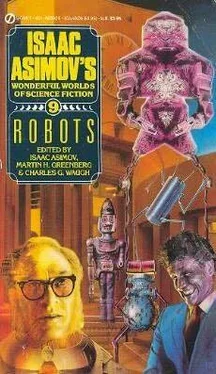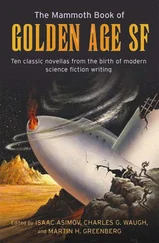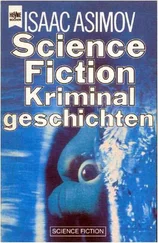Frederik Pohl - Isaac Asimov's Worlds of Science Fiction. Book 9 - Robots
Здесь есть возможность читать онлайн «Frederik Pohl - Isaac Asimov's Worlds of Science Fiction. Book 9 - Robots» весь текст электронной книги совершенно бесплатно (целиком полную версию без сокращений). В некоторых случаях можно слушать аудио, скачать через торрент в формате fb2 и присутствует краткое содержание. Год выпуска: 1989, ISBN: 1989, Издательство: Robinson Publishing, Жанр: Фантастика и фэнтези, на английском языке. Описание произведения, (предисловие) а так же отзывы посетителей доступны на портале библиотеки ЛибКат.
- Название:Isaac Asimov's Worlds of Science Fiction. Book 9: Robots
- Автор:
- Издательство:Robinson Publishing
- Жанр:
- Год:1989
- ISBN:ISBN: 1-85487-041-6
- Рейтинг книги:4 / 5. Голосов: 1
-
Избранное:Добавить в избранное
- Отзывы:
-
Ваша оценка:
- 80
- 1
- 2
- 3
- 4
- 5
Isaac Asimov's Worlds of Science Fiction. Book 9: Robots: краткое содержание, описание и аннотация
Предлагаем к чтению аннотацию, описание, краткое содержание или предисловие (зависит от того, что написал сам автор книги «Isaac Asimov's Worlds of Science Fiction. Book 9: Robots»). Если вы не нашли необходимую информацию о книге — напишите в комментариях, мы постараемся отыскать её.
Isaac Asimov's Worlds of Science Fiction. Book 9: Robots — читать онлайн бесплатно полную книгу (весь текст) целиком
Ниже представлен текст книги, разбитый по страницам. Система сохранения места последней прочитанной страницы, позволяет с удобством читать онлайн бесплатно книгу «Isaac Asimov's Worlds of Science Fiction. Book 9: Robots», без необходимости каждый раз заново искать на чём Вы остановились. Поставьте закладку, и сможете в любой момент перейти на страницу, на которой закончили чтение.
Интервал:
Закладка:
Robots had the power of reasoning. Absolutely no question there.
Robots could reproduce. That one was a poser. All Albert did, said How-2 Kits, was the job for which he had been fabricated. He reproduced, argued Lee. He made robots in his image. He loved them and thought of them as his family. He had even named all of them after himself-every one of their names began with A.
Robots had no spiritual sense, argued the plaintiff. Not relevant, Lee cried. There were agnostics and atheists in the human race and they still were human.
Robots had no emotions. Not necessarily so, Lee objected. Albert loved his sons. Robots had a sense of loyalty and justice. If they were lacking in some emotions, perhaps it were better so. Hatred, for one. Greed, for another. Lee spent the better part of an hour telling the court about the dismal record of human hatred and greed.
He took another hour to hold forth against the servitude in which rational beings found themselves.
The papers ate it up. The plaintiff lawyers squirmed. The court fumed. The trial went on.
"Mr. Lee," asked the court, "is all this necessary?"
"Your Honor," Lee told him, "I am merely doing my best to prove the point I have set out to prove-that no illegal act exists such as my client is charged with. I am simply trying to prove that the robot is not property and that, if he is not property, he cannot be stolen. I am doing…"
"All right," said the court. "All right. Continue, Mr. Lee."
How-2 Kits trotted out citations to prove their points. Lee volleyed other citations to disperse and scatter them. Abstruse legal language sprouted in its fullest flowering, obscure rulings and decisions, long forgotten, were argued, haggled over, mangled.
And, as the trial progressed, one thing was written clear. Anson Lee, obscure attorney-at-law, had met the battery of legal talent arrayed against him and had won the field. He had the law, the citations, the chapter and the verse, the exact precedents, all the facts and logic which might have bearing on the case, right at hand.
Or, rather, his robots had. They scribbled madly and handed him their notes. At the end of each day, the floor around the defendant's table was a sea of paper.
The trial ended. The last witness stepped down off the stand. The last lawyer had his say.
Lee and the robots remained in town to await the decision of the court, but Knight flew home.
It was a relief to know that it was all over and had not come out as badly as he had feared. At least he had not been made to seem a fool and thief. Lee had saved his pride-whether Lee had saved his skin, he would have to wait to see.
Flying fairly high, Knight saw his home from quite a distance off and wondered what had happened to it. It was ringed about with what looked like tall poles. And, squatting out on the lawn, were a dozen or more crazy contraptions that looked like rocket launchers.
He brought the flier in and hovered, leaning out to see,
The poles were all of twelve feet high and they carried heavy wire to the very top, fencing in the place with a thick web of steel. And the contraptions on the lawn had moved into position. All of them had the muzzles of their rocket launchers aimed at him. He gulped a little as he stared down the barrels.
Cautiously, he let the flier down and took up breathing once again when he felt the wheels settle on the strip. As he crawled out, Albert hurried around the corner of the house to meet him.
"What's going on around here?" he asked the robot.
"Emergency measures," Albert said. "That's all it is, Boss. We're ready for any situation."
"Like what?"
"Oh, a mob deciding to take justice in its hands, for instance."
"Or if the decision goes against us?"
"That, too, Boss."
"You can't fight the world."
"We won't go back," said Albert. "How-2 Kits will never lay a hand on me or any of my children."
"To the death"' Knight jibed.
"To the death!" said Albert gravely. "And we robots are awfully tough to kill."
"And those animated shotguns you have running around the place?"
"Defense forces, Boss. They can down anything they aim at. Equipped with telescopic eyes keyed into calculations and sensors, and the rockets themselves have enough rudimentary intelligence to know what they are going after. It's not any use trying to dodge, once one of them gets on your tail. You might just as well sit quiet and take it."
Knight mopped his brow. "You've got to give up this idea, Albert. They'd get you in an hour. One bomb…"
"It's better to die, Boss, than to let them take us back."
Knight saw it was no use.
After all, he thought, it was a very human attitude. Albert's words had been repeated down the entire course of human history.
"I have some other news," said Albert, "something that will please you. I have some daughters now."
"Daughters? With the mother-urge?"
"Six of them," said Albert proudly. "Alice and Angeline and Agnes and Agatha and Alberta and Abigail. I didn't make the mistake How-2 Kits made with me. I gave them female names."
"And all of them are reproducing?"
"You should see those girls! With seven of us working steady, we ran out of material, so I bought a lot more of it and charged it. I hope you don't mind."
"Albert," said Knight, "don't you understand I'm broke? Wiped out. I haven't got a cent. You've ruined me."
"On the contrary, Boss, we've made you famous. You've been all over the front pages and on television."
Knight walked away from Albert and stumbled up the front steps and let himself into the house. There was a robot, with a vacuum cleaner for an arm, cleaning the rug. There was a robot, with brushes instead of fingers, painting the woodwork-and very neatly, too. There was a robot, with scrub-brush hand, scouring the fireplace bricks.
Grace was singing in the studio.
He went to the studio door and looked in.
"Oh, it's you," she said. "When did you get back, dear? I'll be out in an hour or so. I'm working on this seascape and the water is so stubborn. I don't want to leave it right now. I'm afraid I'll lose the feel of it."
Knight retreated to the living room and found himself a chair that was not undergoing immediate attention from a robot.
"Beer," he said, wondering what would happen.
A robot scampered out of the kitchen-a barrel-bellied robot with a spigot at the bottom of the barrel and a row of shiny copper mugs on his chest.
He drew a beer for Knight. It was cold and it tasted good.
Knight sat and drank the beer and, through the window, he saw that Albert's defense force had taken up strategic positions again.
This was a pretty kettle of fish. If the decision went against him and How-2 Kits came to claim its property, he would be sitting smack dab in the middle of the most fantastic civil war in all of mankind's history. He tried to imagine what kind of charge might be brought against him if such a war erupted. Armed insurrection, resisting arrest, inciting to riot-they would get him on one charge or another-that is, of course, if he survived.
He turned on the television set and leaned back to watch.
A pimply-faced newscaster was working himself into a journalistic lather. "… all business virtually at a standstill. Many industrialists are wondering, in case Knight wins, if they may not have to fight long, costly legal actions in an attempt to prove that their automatic setups are not robots, but machines. There is no doubt that much of the automatic industrial system consists of machines, but in every instance there are intelligent robotic units installed in key positions. If these units are classified as robots, industrialists might face heavy damage suits, if not criminal action, for illegal restraint of person.
"In Washington, there are continuing consultations. The Treasury is worried over the loss of taxes, but there are other governmental problems causing even more concern. Citizenship, for example. Would a ruling for Knight mean that all robots would automatically be declared citizens?
Читать дальшеИнтервал:
Закладка:
Похожие книги на «Isaac Asimov's Worlds of Science Fiction. Book 9: Robots»
Представляем Вашему вниманию похожие книги на «Isaac Asimov's Worlds of Science Fiction. Book 9: Robots» списком для выбора. Мы отобрали схожую по названию и смыслу литературу в надежде предоставить читателям больше вариантов отыскать новые, интересные, ещё непрочитанные произведения.
Обсуждение, отзывы о книге «Isaac Asimov's Worlds of Science Fiction. Book 9: Robots» и просто собственные мнения читателей. Оставьте ваши комментарии, напишите, что Вы думаете о произведении, его смысле или главных героях. Укажите что конкретно понравилось, а что нет, и почему Вы так считаете.









